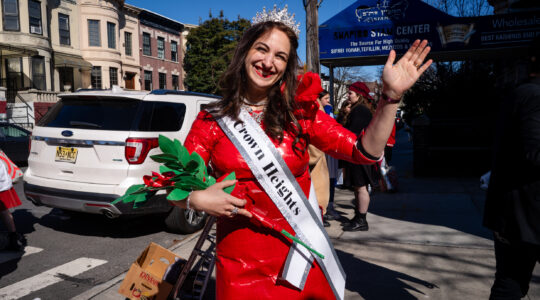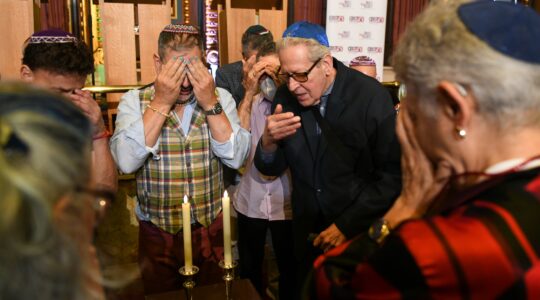With his odes to Italian restaurants and songs about Catholic girls, most Billy Joel fans may never have pegged the "Piano Man" for the scion of a once-thriving German-Jewish mercantile family whose fortunes were swept away in the Holocaust.
One unsuspecting music aficionado was Beate Thalberg. The Austrian filmmaker discovered Joel’s surprising family history while making a TV documentary about his younger half-brother, Alexander, a celebrated orchestra conductor in Europe. Another surprised fan was Lukas Neckermann, whose grandfather had "Aryanized" the Joel family business in 1938.
The meeting of the younger generation of Joels and Neckermanns provides the centerpiece of Thalberg’s 2001 film, "The Joel Files," which has its U.S. premiere next week as part of this year’s New York Jewish Film Festival.
In one hour, the film traces the story of how Karl Amson Joel built up a successful mail-order business, was pushed out by Nazi intimidation, impoverished and forced into exile, while his Aryan successor thrived. The fast-paced documentary also follows Billy and Alexander’s attempts to uncover their family’s past and reconcile with Neckermanns in the present.
"We were but one family out of countless others whose lives were decimated during these times," Billy Joel wrote in a statement last year about the film. The songwriter describes the making of the "The Joel Files" as a "search for closure." Talking to his long-estranged father, Howard, a U.S. army veteran and former manager with General Motors, about his childhood experience "brought his life into a new perspective for me," Joel wrote.
In fact, Joel reunited with his father in the 1970s and only then learned he had a brother in Vienna. Neither he nor Alexander knew much about their family’s fateful odyssey, until Thalberg started asking questions.
In 1998, she was working on a portrait of Alexander Joel, then 26 and a rising star in Vienna, for her regular television show, "Treffpunkt kultur" ("Culture Meeting Point"). While looking through photograph albums at Alexander’s parents’ house, Thalberg came across images from the 1930s that showed the courtyard of a factory.
"I saw those photos and I said, ‘Hey! What’s this?’ " Thalberg told The Jewish Week during a recent trip to New York. "I knew there was something going on, but I couldn’t know, I didn’t know what," she said between sips of a large latte at an Upper West Side restaurant.
A native of East Berlin with family roots in Poland, the filmmaker said that among her generation, "everybody grew up with a little silence, or a big silence. It’s the same whether you’re the grandchild of a Nazi or a Jew. They don’t talk: the parents don’t and the children don’t."
So, during subsequent conversations with Alexander and Howard, Thalberg began gently to probe. "I didn’t want to force it," she said. I would say, ‘Hey, tell me about this company.’ And one day, at the Joel house, Howard told me more."
The story that emerged is both extraordinary and typical of the persecution of Jews in Nazi Germany.
In 1938, Karl Joel, then 49, was running a successful business and living in a fashionable section of Berlin with his wife Meta and 15-year-old son Helmuth (now Howard). A few years earlier, the family had been driven from their hometown of Nuremberg by a smear campaign launched by Julius Streicher, the infamous editor of the virulently anti-Semitic newspaper Der Stuermer.
Boycotts of Jewish businesses were forcing many Jews to sell out at undervalued prices. In 1937, Joel’s business was still profitable, but soon "Aryan suppliers" cut off their shipments and Joel’s goods were marked with a "J" for "Jewish goods." In the summer of 1938, Joel was forced to sell, and through the Aryan lawyer he was required to hire, negotiated a price of 2.3 million Reichmarks for his life’s work. (His lawyers would later estimate the company’s value at six times that amount.)
The purchaser was Josef Neckermann, a 25-year-old Wuerzberg native and Nazi-party member who earlier had bought out the Jewish department store king, Siegmund Ruschkewitz. Without realizing the significance of his actions, Neckermann reportedly wrote in his memoirs, "I just carefully stirred my cup of coffee … and thus became an aryaniser."
Fearing for their lives, the Joels fled to Switzerland. Then, after being swindled by a Berlin city official who had promised to help them get more money from Neckermann, they left for England, then Cuba, and finally New York. There, Karl Joel opened a small store, but his life remained a constant economic struggle.
In Germany, Neckermann maximized on Joel’s successful business, turning production over to the Nazi war effort and even using labor from the Lodz ghetto. After the war, Neckermann served time for having illegally appropriated property during the Nazi reign. Once freed, however, he made his company a household name. Hailed as a postwar industrial leader, Neckermann also won six Olympic medals for horseback riding.
In 1949, Joel successfully sued Neckermann for compensation in a Nuremberg court. After eight years, the parties settled and the files were closed. Only days later, and without legal recourse, Joel discovered a letter proving that Neckermann had cheated him a second time.
(Karl Joel died in the early 1980s at age 92. Josef Neckermann died in 1992, shortly before his 80th birthday.)
Half a century later, Alexander Joel went to the municipal archives in Ansbach, near Nuremberg and uncovered the files that determined his grandfather’s destiny.
The younger Joel bears a strong resemblance to his older sibling, but speaks with a British lilt instead of a Long Island accent, the product of a European upbringing. "The important thing is to not be bitter about what happened," he says in the film. People of his generation, "have to be even more aware of what happened."
But, of course, some people remain passively ignorant.
For Thalberg, one of the most difficult aspects of "The Joel Files" was the meeting in Vienna between Billy and Alexander Joel and the Neckermann grandchildren, Lukas, Markus and Julia.
"They didn’t get it," Thalberg said of the Neckermanns.
Raised in the United States and now living in Germany, they had read their grandfather’s autobiography and knew of the Joel family. They were even eager to meet with Billy and Joel, and, naturally were intrigued by their connection, however bitter, to the pop superstar.
"But they didn’t ask," Thalberg said. "They never asked at home how it was really in the past. I started from zero with them."
At one point in the meeting, Julia says, "My grandfather’s way of fighting the [Nazi] regime was to help people have jobs."
Off camera, Thalberg said, "Billy Joel’s face goes down, and he didn’t say one word after that, except ‘OK.’ "
In his May 2001 letter to the filmmakers, Billy Joel thanks the Neckermann family for their willingness to participate in the film. On camera, he, like his brother, stresses the importance of remembering without bitterness. Otherwise, he says, "the bad guys won."
But Thalberg begins her film with an enigmatic quote that sets the tone for the intertwining stories that unravel in "The Joel Files."
Sitting in front of a piano, Billy Joel says: "You have the same characteristics as your family did, whether you want to or not. What you do with all that equipment is really what the difference is between you and who came before you."
"The Joel Files" will be screened as part of the Twelfth Annual New York Jewish Film Festival, Walter Reade Theater, 165 W. 65th St., Man. Mon., Jan. 20 at 3:30 p.m. and 8:30 p.m.; Tues., Jan. 21, 9 p.m. $9.50-$5. It will also be screened Jan. 25-26 at the Jacob Burns Film Center in Pleasantville. Call (914) 747-5555 or visit www.burnsfilmcenter.org for information.
The New York Jewish Week brings you the stories behind the headlines, keeping you connected to Jewish life in New York. Help sustain the reporting you trust by donating today.




